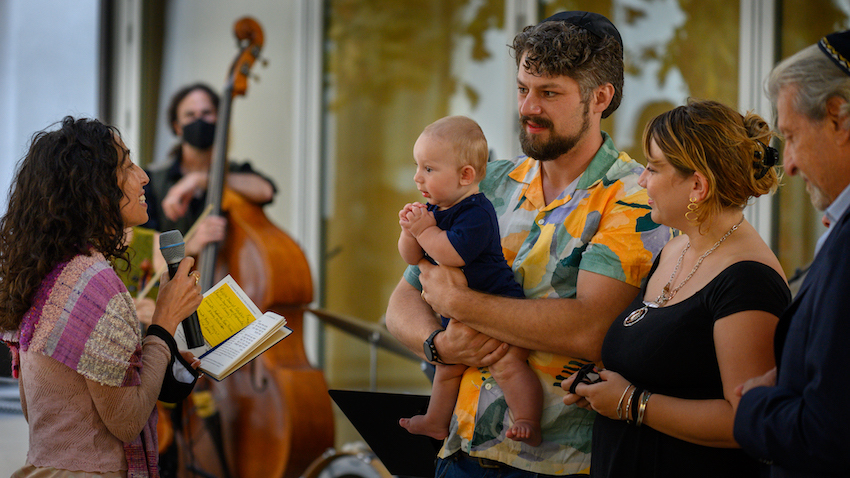Your Daily Phil: JFNA’s Investment Institute returns + NJHSA offers cash for COVID vaccines
Good Tuesday morning!
The Network of Jewish Human Services Agencies (NJHSA)will conduct a webinar today to introduce “Flex for Checks,” a new program that will offer a $50 COVID-19 vaccine incentive to health care workers in its 140 member agencies, NJHSA CEO Reuben Rotman told eJewishPhilanthropy.
“The vision for the program is to provide added incentivesto encourage vaccination,” Rotman said. “It’s in keeping with the network’s vision of doing all that we can to support agencies in their efforts to keep their communities safe.”
The program is a partnership with the National Minority Health Association and Nevvon, which provides educational services for home health aides. The National Minority Health Association has federal funding from the Health Resources and Services Administration (HRSA) to support the program, Rotman said.
Some NJHSA agencies have tried to use other incentives,such as gift cards or increased time off, but this program is the first one backed by federal funding, Rotman said.
Travelers to Israel who have been vaccinated abroad can be released from isolation after undergoing a serological test in Israel, the Health Ministry announced today.
BUSINESS SCHOOL
JFNA sees broader need for its Investment Institute


iStock
The cancellation of Jewish Federations of North America’s (JFNA) 2020 Investment Institute might ultimately lead to an expanded role for the program between its official biennial meetings, Steve Gross, JFNA’s senior director of institutional advancement, planned giving and endowments, told eJewishPhilanthropy’s Helen Chernikoff.
A biennial convening: Held since 2001, the institute gathers 150-250 federation professionals, investment committee chairs and members, financial services providers, high-net-worth donors, private foundation trustees and academics for sessions on how best to grow charitable donations to federations. “How do you invest Jewish philanthropic dollars? How do you steward them? That’s what the institute tries to focus on, in a number of different ways,” Gross said. The last meeting of the institute, scheduled for March 2020, was canceled due to the coronavirus pandemic, then in its infancy.
New offerings: In the interim, JFNA began offering quarterly webinars on topics useful to the chief financial officers, endowment and pension fund administrators and other financial experts working to manage the $21 billion assets under management in the 146-member federation system. The most recent such program focused on special purpose acquisition companies (SPACs), non-fungible tokens (NFTs) and cryptocurrency, the encrypted, unregulated asset class nonprofits are increasingly accepting as donations.
Growing the program: Now, JFNA is also looking to become more of a resource center for the federations it serves, Gross said. It might advise federations on how to best bring on new members of their investment committees, which are comprised of lay people who work in investing or related fields and volunteer their time to help their local federations manage their endowments and other assets. In some situations, JFNA might provide more guidance on investment decisions. “We are hoping that there will be more ongoing programs to talk about different issues related to the economy, investments, governance,” Gross said.
ORTHODOX COMMUNAL FINDINGS
Who will enjoy tranquility and who will suffer: The impact of the pandemic on mental health


Shutterstock
“Was I alone or were you right there with me in assuming that, as we faced Rosh Hashanah last year, we’d be striding forward into a sweet, new and COVID-19-free year?” asks Adina Bankier-Karp, a research fellow at the Center for Communal Research at the Orthodox Union, in an opinion piece for eJewishPhilanthropy.
Chazak v’ematz: “In terms of mental health, who was struggling with stress, depression and anxiety and who was lonely in 2020? Given that congregational prayer, Jewish learning and Shabbat meals with family and friends are core aspects of Orthodox life, how did the community fare without them? At the OU’s Center for Communal Research, we set out to answer those burning questions. Resilience of mind, body and spirit is a blessing. Moses bestowed it upon Joshua in his declaration ‘chazak v’ematz’ (be strong and resilient) as he handed over the mantle of leadership. Who suffered, who was OK, and who thrived during the pandemic?”
Generational differences: “Contrary to our original assumptions, we learned that it was not the elderly but younger people who had the highest rates of stress, anxiety and depression. People over 65 were also less lonely than those [who are] younger.”
CHOOSING JUDAISM
You are Jewish enough: Our message to interfaith couples and families with members of diverse heritages


iStock
“In 21st-century America, being part of the Jewish community is voluntary. The argument for Jewish communal engagement is that it adds meaning and beauty, which improves lives and betters the world. The learning one has access to, and the support one receives, are invaluable. Ideally, engagement can be accessed from any starting point; there are no prerequisites,” write Paul Golin of the Society for Humanistic Judaism and Keren McGinity of the United Synagogue of Conservative Judaism, in an opinion piece for eJewishPhilanthropy.
A choice: “The argument for Jewish engagement is not a moral one, it is an invitation to enjoy the richness that living a Jewish life offers. Therefore, it should not include holier-than-thou righteousness about who is ‘more’ or ‘less’ Jewish. Most Jews view Jewish communal affiliation as a choice, not as a moral or ethical imperative. They understand that you can be a good person without praying regularly, marrying a fellow Jew, giving to a Jewish-specific charity or countless other behaviors deemed ‘good for the Jews.’”
Jewish enough: “For several decades, the major subgrouping was between the intermarried and in-married, with studies positioning the intermarried as ‘less than’ on measures cared about most by Jewish institutions, like affiliating with a synagogue or raising Jewish children. Since almost all Jewish communal leaders were in-married themselves, all the woes of disaffiliation were blamed on the intermarried without digging much deeper into methodology or agenda.”
Worthy Reads
Enhanced Vision: The Center for American Progress’s new report on how the Biden administration can advance gender equality focuses on how the White House’s Gender Policy Council can expand the Women, Peace and Security Act of 2017, reports Kimberly Pike in a blog post on the Women Philanthropy website. The report recommends that all decision-making, including decision and action memos going to the president and Cabinet secretaries, use a gender lens, and that national security personnel receive training on how to conduct gender analysis. [WomenPhilanthropy]
Both/And: In Philanthropy Daily, Carter Skeel urges fundraisers to reject the common platitude, “It’s about the relationship, not the money.” The expression is lazy, he writes, because it creates a false dichotomy, when in reality, most such relationships of any depth are a combination of the emotional and the transactional. “We owe it to the organization we serve, and, frankly, to our donors themselves, to eschew simplistic conceptions of the donor relationship and its purpose,” Skeel writes. “The nuance I hope to add is the recognition that one’s responsibilities as a development officer need not crowd out one’s responsibilities to a friend.” [PhilanthropyDaily]
Serious Lessons: While many American corporations pledged to support diversity, equity and inclusion (DEI) in the wake of the murder of George Floyd by Minneapolis police, the restaurant chain Denny’s has been working on these issues since 1994 when it settled a discrimination lawsuit, and its experience might be valuable to other corporations who are just starting these initiatives, write April Kelly-Drummond, Fasika Melaku-Peterson and John C. Miller in Harvard Business Review. To create a diverse workforce, which simultaneously builds a pipeline for future promotions to senior positions, hiring managers were asked to examine their decisions for “affinity bias” — the desire to work with someone like them — which is often described as “culture fit.” “DEI is a long trip because the goal is always improvement and forward progress, not to find a comfortable stopping point,” the authors conclude. “Leaders in this space need to be comfortable consistently critiquing themselves.” [HBR]
Community Comms
Apply! Want to join the team at Jewish Insider/eJewish Philanthropy? We’re looking for a top-notch philanthropy editor. Learn more here.
Be featured: Email us to inform the eJP readership of your upcoming event, job opening, or other communication.
Word on the Street
Candid released its annual Nonprofit Compensation Report, the only large-scale analysis of its kind based entirely on data reported to the IRS… A report from the NYU Stern Center for Business and Human Rights finds social media platforms such as Facebook, Twitter and YouTube have played a major role in fueling the political polarization that have led to violence, especially since the 2016 election… The Israeli government approved a NIS 156 million (approx. $49 million) budget aimed at creating equal opportunities, combating discrimination and integrating the Ethiopian-Israeli community into general society… Refugee-resettlement groupsacross the United States are reporting a rush of donations and volunteers to help welcome immigrants fleeing Afghanistan… John Streicker donated an additional $10 million to Manhattan’s Temple Emanu-El, bringing his total gift to $25 million… The William Davidson Foundation is building a new headquarters in Bloomfield Hills, Mich., to increase visibility…
Pic of the Day


Temple Israel of Hollywood
The Jewish Community Foundation of Los Angeles last week announced its largest-ever disbursement — grants totaling $3.7 million to 45 institutions, including Temple Israel of Hollywood.
Birthdays


Anna Moneymaker/Getty Images
Mayor of Miami-Dade County, Daniella Levine Cava…
Actor, writer and director with a 50-year career in film and TV, Walter Koenig… Basketball coach enshrined in the Hall of Fame, Larry Brown… CEO of MDC Holdings and chairman of the Simon Wiesenthal Center and longtime AIPAC board member, Larry A. Mizel… Partner at San Diego-based CaseyGerry, a specialist in mass torts, Frederick A. Schenk… Plastic surgeon and TV personality, Dr. Terry Dubrow… NYC-based chairman and chief investment officer of The Electrum Group, he is the world’s largest private collector of Rembrandt paintings, Thomas Scott Kaplan… Strategic advisor at Wye Communications, Amy Kauffman… Founder of Vermont-based Kidrobot, a retailer of art toys, apparel and accessories, and Ello, an ad-free social network, Paul Budnitz… British secretary of state for transport, he was a national president of BBYO, Grant Shapps… President of Strauss Media Strategies, during the Clinton administration he became the first-ever White House radio director, Richard Strauss… Managing director at Gasthalter, Mark A. Semer… Comedian, actor, writer and producer, Elon Gold… Managing partner of Berke Farah LLP, Elliot S. Berke… Senior national political reporter for Bloomberg, Jennifer Jacobs… Public relations professional, Courtney Cohen Flantzer… Governor of Florida, Ron DeSantis… Israeli-American actress, Hani Furstenberg… Artist, photographer and educator, Marisa Scheinfeld… Staff writer at The Atlantic, Russell Berman… Co-founder and co-executive director of the Indivisible movement, Leah Greenberg… Los Angeles-based attorney at Sony Pictures Entertainment, Roxana Pourshalimi… New York Times reporter covering national politics, Matt Flegenheimer… Founder and owner of ARA Capital, Arkadiy Abramovich… Senior account supervisor at DKC, Julia Savel… Artistic gymnast, she represented Israel at the 2020 Summer Olympics, Lihie Raz…
Email Editor@eJewishPhilanthropy.com to have your birthday included.








